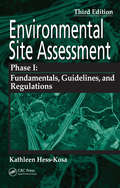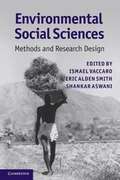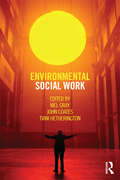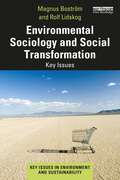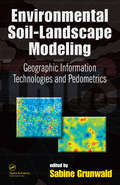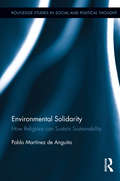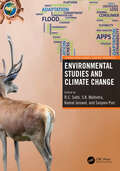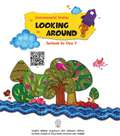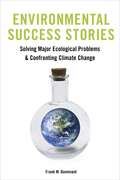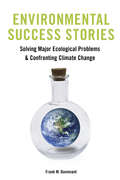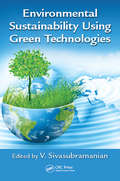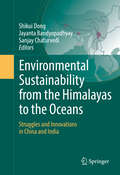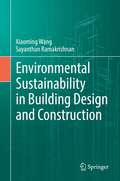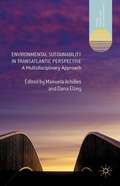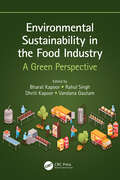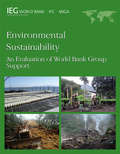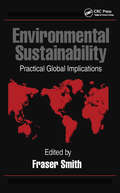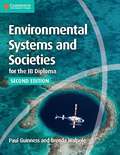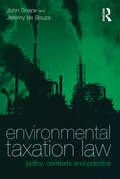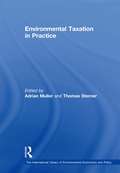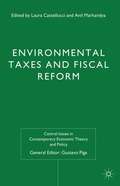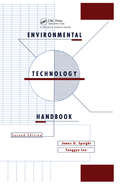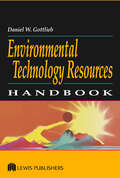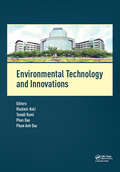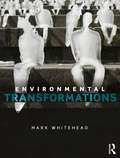- Table View
- List View
Environmental Site Assessment Phase I: A Basic Guide, Third Edition
by Kathleen Hess-KosaExtensively updated, this third edition provides a valuable guide to the tools and techniques used to perform Phase 1 site assessment. This book elucidates the systematic processes and methods used by leaders in the industry. It also emphasizes the development of an easy-to-follow investigative strategy for in-house assessment. After reviewing the history of the field, legal issues, and important terms, the book discusses physical setting, historic usage, property and area reconnaissance, building materials, and industrial activities associated with a property. It also gives interviewing tips, lists regulatory agencies, and considers unique situations such as wetlands and historical buildings.
Environmental Social Sciences: Methods and Research Design
by Ismael Vaccaro Eric Alden Smith Shankar AswaniThe relationship between human communities and the environment is extremely complex. In order to resolve the issues involved with this relationship, interdisciplinary research combining natural sciences, social sciences, and humanities is necessary. Here, specialists summarise methods and research strategies for various aspects of social research devoted to environmental issues. Each chapter is illustrated with ethnographic and environmental examples, ranging from Australia to Amazonia, from Madagascar to the United States, and from prehistoric and historic cases to contemporary rural and urban ones. It deals with climate change, deforestation, environmental knowledge, natural reserves, politics and ownership of natural resources, and the effect of differing spatial and temporal scales. Contributing to the intellectual project of interdisciplinary environmental social science, this book shows the possibilities social science can provide to environmental studies and to larger global problems and thus will be of equal interest to social and natural scientists and policy makers.
Environmental Social Work: Racial Preference In Black And White (Positions: Education, Politics, And Culture Ser.)
by Tim J. WiseSocial work has been late to engage with the environmental movement. Often working with an exclusively social understanding of environment, much of the social work profession has overlooked the importance of environmental issues. However, recently, the impact of and worldwide attention to climate change, a string of natural disasters, and increased understanding of issues around environmental justice has put the environment, sustainability, and well-being in the spotlight. Divided into three parts, this field-defining work explores what environmental social work is, and how it can be put into practice. The first section focuses on theory, discussing ecological and social justice, as well as sustainability, spirituality and human rights. The second section comprises case studies of evolving environmental social work practice. The case studies derive from a range of areas from urban gardens and community organizing to practice with those affected by climate change. The final section – relevant to students and lecturers – looks at learning about environmental issues in social work. Environmental Social Work provides an integrated theoretical and practical overview of why and how social work might respond to environmental factors affecting the societies and people they work with at international, national, local and individual levels.
Environmental Sociology and Social Transformation: Key Issues (ISSN)
by Rolf Lidskog Magnus BoströmEnvironmental Sociology and Social Transformation demonstrates how sociological theory and research are critical for understanding the social drivers of global environmental destruction and the conditions for transformative change.Written by two professors of sociology who are deeply involved in the international community of environmental sociology, Magnus Boström and Rolf Lidskog argue that we need to better understand society as well as the fundamentally social nature of environmental problems and how they can be addressed. The authors provide answers to why so many unsustainable practices are maintained and supported by institutions and actors despite widespread knowledge of their negative consequences. Employing a pluralistic sociological approach to the study of social transformations, the book is divided into five key themes: Causes, Distributions, Understandings, Barriers, and Transformation. Overall, the book offers an integrative and comprehensive understanding of the social dimension of (un)sustainability, societal inertia, and conditions for transformative change. It provides the reader with references from classic and contemporary sociology and uses pedagogical features including boxes and questions for discussion to help embed learning.Arguing that a broad and deep social transformation is needed to avoid a global civilization crisis, Environmental Sociology and Social Transformation will be a great resource for students and scholars who are exploring current environmental challenges and the societal conditions for meeting them.
Environmental Soil-Landscape Modeling: Geographic Information Technologies and Pedometrics
by Sabine GrunwaldEnvironmental Soil-Landscape Modeling: Geographic Information Technologies and Pedometrics presents the latest methodological developments in soil-landscape modeling. It analyzes many recently developed measurement tools, and explains computer-related and pedometric techniques that are invaluable in the modeling process.This volume provi
Environmental Solidarity: How Religions Can Sustain Sustainability (Routledge Studies in Social and Political Thought)
by Pablo Martínez de AnguitaThe past few decades have seen the beginnings of a convergence between religions and ecological movements. The environmental crisis has called the religions of the world to respond by finding their voice within the larger Earth community. At the same time, a certain religiosity has started to emerge in some areas of secular ecological thinking. Beyond mere religious utilitarianism, rooted in an understanding of the deepest connections between human beings, their worldviews, and nature itself, this book tries to show how religious believers can look at the world through the eyes of faith and find a broader paradigm to sustain sustainability, proposing a model for transposing this paradigm into practice, so as to develop long-term sustainable solutions that can be tested against reality.
Environmental Studies and Climate Change (Translating Animal Science Research)
by S. K. Malhotra Sanjeev Puri R. C. Sobti Kamal JaiswalCurrently, anthropogenic activities have caused unprecedented destruction of the environment at alarming rates, leading to undesirable alterations in air, land, and water. The process of environment degradation has been accelerated by industrial processes, which result in waste as well as over-consumption of natural resources. The ecological balance has been disturbed, and resources have shrunk. All this has resulted in climate change, which has emerged as a major concern in the 21st century. Changes in the environment are driven by demand for energy, water, and food to raise the standard of living. These are also responsible for climate change, with contributions from deforestation and CO2 emissions from fossil fuels such as coal and petroleum. The present volume discusses some of the main issues regarding environmental degradation and the causes as well as the impact of climate change, which is impacting the ecosystem. The effects of various pollutants, causes of climate change with case studies on geochemistry and glaciers, etc., and measures to reduce the impact on biodiversity, health, etc. are discussed in detail in its chapters. In a nutshell, this volume discusses in detail the following issues: • Anthropogenic and natural factors in environmental degradation • Climate change history, causes, and threats to abiotic and biotic systems • Case studies on the impact of climate change and living systems • Mitigation and preparedness for the future
Environmental Studies: Looking Around class 5 - NCERT - 23
by National Council of Educational Research and TrainingThis a textbook for Class V Environmental Studies, published by the National Council of Educational Research and Training (NCERT) in India. It covers six themes related to the natural and social environment of children, such as family and friends, food, water, shelter, travel, and things we make and do. The textbook aims to link children’s life at school with their life outside the school, and to encourage them to observe, explore, question, and experiment with their surroundings. The textbook also tries to develop children’s sensitivity towards the diversity and interdependence of life forms, and to foster a concern for justice and equality in society. The textbook consists of 22 chapters, each with activities, illustrations, and questions for assessment. The textbook follows the guidelines of the National Curriculum Framework (2005) and the syllabus designed by NCERT for primary level education.
Environmental Success Stories: Solving Major Ecological Problems And Confronting Climate Change
by Kari Marie Norgaard Frank DunnivantUnlike many titles on environmental issues that portend a dark future, Environmental Success Stories delves into the most daunting ecological and environmental challenges humankind has faced and shows how scientists, citizens, and a responsive public sector have dealt with them successfully. <P><P> In addition to presenting the basic chemical and environmental science underlying problems like providing clean drinking water, removing DDT and lead from agriculture and our homes, and curtailing industrial pollution, this book also discusses the political actors, agency regulators, and community leaders who have collaborated to enact effective legislation. Sharing the stories of the people, organizations, and governments who have addressed these problems successfully, Frank M. Dunnivant explains how we might confront the world's largest and most complex environmental crisis: climate change. Now is the time for rededicated scientific exploration and enlightened citizen action to save our environment, and Dunnivant's book offers a stirring call to action.
Environmental Success Stories: Solving Major Ecological Problems and Confronting Climate Change
by Frank DunnivantUnlike many titles on environmental issues that portend a dark future, Environmental Success Stories delves into the most daunting ecological and environmental challenges humankind has faced and shows how scientists, citizens, and a responsive public sector have dealt with them successfully.In addition to presenting the basic chemical and environmental science underlying problems like providing clean drinking water, removing DDT and lead from agriculture and our homes, and curtailing industrial pollution, this book also discusses the political actors, agency regulators, and community leaders who have collaborated to enact effective legislation. Sharing the stories of the people, organizations, and governments who have addressed these problems successfully, Frank M. Dunnivant explains how we might confront the world's largest and most complex environmental crisis: climate change. Now is the time for rededicated scientific exploration and enlightened citizen action to save our environment, and Dunnivant's book offers a stirring call to action.
Environmental Sustainability Using Green Technologies
by V. SivasubramanianEnvironmental Sustainability Using Green Technologies explains the role of green engineering and social responsibility in the development of chemicals, processes, products, and systems. Examining the relationship between economy, ecology, and equality—key factors in developing a sustainable society—this book covers several aspects of environmental sustainability, explores ways to use resources and processes more responsibly, and describes the tools required to overcome various challenges. It outlines the biotechnological applications, techniques, and processes needed to secure sustainable development and ensure long-lasting future success. Insightful and highly comprehensive, this body of work addresses: Wastewater treatment technologies Nanomaterials in environmental applications Green synthesis of ecofriendly nanoparticles The role of phytoremediation in maintaining environmental sustainability Algal biosorption of heavy metals Mass production of microalgae for industrial applications Integrated biological system for the treatment of sulfate rich wastewater Anaerobic digestion of pharmaceutical effluent Treatment of textile dye using bioaccumulation techniques Production of biosurfactants and their applications in bioremediation Biodegradable polymers Microbial fuel cell (MFC) technology Biodiesel from nonedible oil using a packed bed membrane reactor Production of ecofriendly biodiesel from marine sources Pretreatment techniques for the enhancement of biogas production A review of source apportionment of air pollutants by receptor models and more Environmental Sustainability Using Green Technologies provides excellent reference material that aids and supports sustainability, and offers practical guidance for professors, research scholars, industrialists, biotechnologists, and workers in the applied field of environmental engineering.
Environmental Sustainability from the Himalayas to the Oceans
by Shikui Dong Sanjay Chaturvedi Jayanta BandyopadhyayThe book is written in the backdrop of the environmental impacts of and future requirements from the natural environment for rapid economic growth that has characterized recent economic history of China and India, especially over the past few decades. The environmental impacts of such rapid economic changes have been, more frequently than otherwise, degrading in character. Environmental impacts of economic activities create degraded natural ecosystems by over utilization of nature's provisioning ecosystem services (from Himalaya to the Ocean), as well, by the use of the natural environment as sink for dumping of unmarketable products or unused inputs of economic activities. Such processes affect wide range of ecosystem processes on which the natural environment including human population depend on. Critical perspectives cast by various chapters in this book draw attention to the various ways in which space and power interact to produce diverse geographies of sustainability in a globalizing world. They also address the questions such as who decides what kind of a spatial arrangement of political power is needed for sustaining the environment. Who stands to gain (or lose) what, when, where, and why from certain geographical areas being demarcated as ecologically unique, fragile and vulnerable environments? Whose needs and values are being catered to by a given ecosystem service? What is the scope for critical inquiry into the ways in which the environment is imagined, represented and resisted in both geopolitical struggles and everyday life? The book provides insights to both academics from diverse disciplines and policy makers, civil society actors interested in mutual exchange of knowledge between China and India.
Environmental Sustainability in Building Design and Construction
by Xiaoming Wang Sayanthan RamakrishnanThis monograph offers analyses of construction activities using various key concepts and assessments of sustainable development, and provides students and researchers with methodologies and design aspects for the sustainable development of the built environment. Additionally, the book demonstrates various national and international policies for assisting architects, engineers and policy makers in understanding the relevant decision-making approaches to sustainable development in construction. The book begins by reviewing the background of sustainability and sustainable development. The focus then turns to the effects of climate change on the built environment, including impacts of energy and carbon emissions, as well as constraints on water and waste management. The remaining chapters discuss the necessary approaches to achieve sustainable waste management, energy efficient building design, and resilience and adaptation in the built environment In eight chapters, the book encourages readers to think independently, logically and objectively about the complex issues presented by the applications of sustainable development in construction, including resource efficiency, environmental impacts, human health, building economics and social development.
Environmental Sustainability in Transatlantic Perspective: A Multidisciplinary Approach
by Manuela Achilles Dana ElzeyExperts from business, academia, governmental agencies and non-profit think tanks to form a transnational and multi-disciplinary perspectives on the combined challenges of environmental sustainability and energy security in the United States and Germany.
Environmental Sustainability in the Food Industry: A Green Perspective
by Rahul Singh Bharat Kapoor Dhriti KapoorCriticisms facing the food processing industry include adverse ecological impacts like decline in biodiversity, environmental degradation, water pollution, eutrophication, greenhouse gas emissions, and the loss of agricultural land. Environmental Sustainability in the Food Industry: A Green Perspective delves into the effect of food processing on the environment, human health, nutrition, energy efficiency, nanotechnology in food industry, and the maintenance of ecological sustainability. The book presents eco-friendly approaches to reducing the impacts of food processing on the environment and to promoting sustainable development. The focus of this text is how to implement green practices in the food industry to reduce the negative impacts of food processing on the ecosystem, as well as to improve food quality for better human health and nutrition. The text also explains the food industry’s focus on sustainable aspects in resource conservation and reduction of energy consumption. Key Features: Describes the contribution of the food industry sector on human health and nutrition Covers eco-friendly approaches to reducing negative impacts of food processing on the environment Discusses the uses of advanced techniques such as nanotechnology, non-thermal techniques, and more to improve food processing The book highlights details related to the food industry and environmental issues. It is a great resource for students, researchers, and professionals alike, as well as anyone with an interest in green paths to food quality and nutrition.
Environmental Sustainability: An Evaluation of World Bank Group Support
by World BankThis evaluation assesses the Bank Group's support for environmental sustainability in both the public and private sectors over the past 15 years. It identifies several crucial constraints that need to be addressed, perhaps most importantly insufficient government commitment to environmental goals and weak institutional capacity to deal with them. But constraints within the Bank Group, including insufficient attention to longer-term sustainable development, must be reduced as well. The Bank Group needs improved systems in place--across the World Bank, IFC, and MIGA--to monitor environmental outcomes and to assess impacts. Better coordination among the three parts of the Bank Group is also among the key challenges.
Environmental Sustainability: Practical Global Applications
by Fraser SmithIn 1994, representatives from all over the world met in Costa Rica to discuss the impact of ecological economics on developing countries. That groundbreaking conference laid the foundation for this new collection of research on environmental sustainability. While most discussions on sustainable development focus on the industrialized nations, Environmental Sustainability: Practical Global Applications takes a different angle: it presents the views of the developing countries themselves on issues such as wildlife resources in Nambia, timber production in Costa Rica, property rights and land reform in South Africa, and other steps being taken to implement environmentally sustainable economies around the world.This is an ideal text for students of natural and social sciences, development professionals and entrepreneurs seeking opportunities for ecologically sustainable businesses. Academics will find it useful as a source of current research and for making new contacts in the field. For anyone interested in exploring the link between man and his environment-specifically, the relationship between economics and ecology- Environmental Sustainability, is a must.
Environmental Systems and Societies for the IB Diploma (IB Diploma Series)
by Brenda Walpole Paul GuinnessThis book covers the syllabus for the IB Diploma Programme Environmental Systems and Societies, which is offered at Standard Level only. Our understanding of the environment and its importance to our lives has grown rapidly over recent decades and the Environmental Systems and Societies course
Environmental Taxation Law: Policy, Contexts and Practice
by John Snape Jeremy de SouzaThe theoretical arguments for environmental taxes and other types of economic instruments for environmental protection have been discussed extensively in the literature. Rather less well discussed has been the extremely complex form that such instruments have in fact taken in practice. Environmental Taxation Law: Policy, Contexts and Practice examines the legal implications of introducing environmental taxes and other economic instruments into the regulatory framework of UK law. In doing so, it analyzes and explains the difficulties of grafting environmental taxes onto the complexities of existing regulatory structures, not all of which, of course, were originally devised with environmental considerations in mind. Although the focus of the book is the UK's pioneering implementation of a web of distinct yet interrelated policy measures, it locates the UK's taxes and instruments not simply in their broader context of market and environmental regulation, but also in the contexts of European and international law.
Environmental Taxation in Practice (The International Library of Environmental Economics and Policy)
by Thomas SternerSince the 1980's, market-based instruments for environmental policy have become increasingly important. Focusing on environmental taxation in practice, this volume collects key contributions on a wide range of topics, including comparisons of environmental taxation schemes in different countries, political economy issues and key aspects of concrete implementation. It presents a wealth of ex-ante and ex-post analyses, intended as a source of guidance for policy implementation and research. The volume features a full-length introduction locating the literature on environmental taxation in practice in a wider context of theoretical and applied issues.
Environmental Taxes and Fiscal Reform (Central Issues in Contemporary Economic Theory and Policy)
by Laura Castellucci Anil MarkandyaA review of the literature on environmental taxes, focusing on European experiences, and analysing how such taxes can contribute to green causes as well as reducing the tax burden from "ordinary" taxation. The authors examine the potential 'double dividend' from tax reform for helping the environment, reducing unemployment and encouraging growth.
Environmental Technology Handbook: 2nd Edition (Applied Energy Technology Ser.)
by James G SpeightHistorically, the development of civilization has upset much of the earth’s ecosystem leading to air, land, and water pollution. The author defines pollution as the introduction of a foreign substance into an ecosystem via air, land or water. This book delves into issues that effect the everyday lives of people who come in contact with these hazards. By examining these issues, this body of work aims to stimulate debate and offer solutions to the ever-growing threat to the environment and humanity. Includes problems with each chapter, Explores issues such as control of gaseous emissions, waste recycling and waste disposal, Explains physical and thermal methods of waste management, Provides definitions and resources for future reference, Discusses the history of environmental technology.
Environmental Technology Resources Handbook
by Daniel W. GottliebThis handbook guides the user to hundreds of technologies, practices, partnership opportunities, and funding resources. Presented in non-technical language, it covers hundreds of publicly available resources for pollution prevention, control, remediation, and assessment. Environmental Technology Resources Handbook will help you:
Environmental Technology and Innovations: Proceedings of the 1st International Conference on Environmental Technology and Innovations (Ho Chi Minh City, Vietnam, 23-25 November 2016)
by Vladimír Kočí, Tomáš Ruml, Phan Dao & Pham Anh DucThis book covers a wide range of topics within enviromental engineering and technologies including: • General environmental engineering• Clean energy and sustainability• Water and wastewater management• Public health and environment. The application areas range from emerging pollutants of air, soil and water environment, remediation technologies, clean energy and sustainability of biofuels, waste to energy, water and wastewater management, public health and the environment, quality and safety of food production to environmental planning and management and policies for cities and regions. The papers cover both theory and applications, and are focused on a wide range of sectors and problem areas. Integral demonstrations of the use of reliability and environmental engineering are provided in many practical applications concerning major technological approaches. Environmental Technology and Innovations will be of interest to academics and professionals working in a wide range of industrial, governmental and academic sectors, including water and waste management, energy generation, fuel production and use, protection of natural heritage, industrial ecology, man health protection and policy making.
Environmental Transformations: A Geography of the Anthropocene
by Mark WhiteheadFrom the depths of the oceans to the highest reaches of the atmosphere, the human impact on the environment is significant and undeniable. These forms of global and local environmental change collectively appear to signal the arrival of a new geological epoch: the Anthropocene. This is a geological era defined not by natural environmental fluctuations or meteorite impacts, but by collective actions of humanity. Environmental Transformations offers a concise and accessible introduction to the human practices and systems that sustain the Anthropocene. It combines accounts of the carbon cycle, global heat balances, entropy, hydrology, forest ecology and pedology, with theories of demography, war, industrial capitalism, urban development, state theory and behavioural psychology. This book charts the particular role of geography and geographers in studying environmental change and its human drivers. It provides a review of critical theories that can help to uncover the socio-economic and political factors that influence environmental change. It also explores key issues in contemporary environmental studies, such as resource use, water scarcity, climate change, industrial pollution and deforestation. These issues are 'mapped' through a series of geographical case studies to illustrate the particular value of geographical notions of space, place and scale, in uncovering the complex nature of environmental change in different socio-economic, political and cultural contexts. Finally, the book considers the different ways in which nations, communities and individuals around the world are adapting to environmental change in the twenty-first century. Particular attention is given throughout to the uneven geographical opportunities that different communities have to adapt to environmental change and to the questions of social justice this situation raises. This book encourages students to engage in the scientific uncertainties that surround the study of environmental change, while also discussing both pessimistic and more optimistic views on the ability of humanity to address the environmental challenges of our current era.
